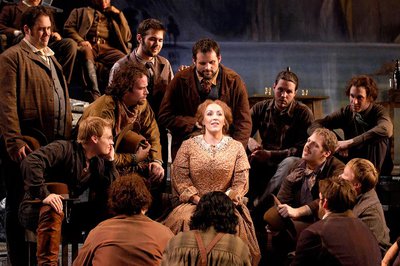
More than half a century before Sergio Leone, Ennio Morricone, Clint Eastwood et al brought us an Italian view of the American West’s good/bad old days, New York’s Metropolitan Opera asked famed Italian composer Giacomo Puccini to make a new opera from a play of the Gold Rush days. The March 14 and 16 performances of that pioneer-period drama The Girl of the Golden West are a pioneering step for the Eugene Opera, too: Not only is this Hult Center performance the local premiere of Puccini’s favorite among his operas, it also continues the plucky company’s recent willingness to take chances, albeit this time not with contemporary works, alas, but with less familiar fare.
Less popular with audiences than critics (despite the 55 standing ovations it earned at its 1910 premiere), The Girl of the Golden West has never been one of those endlessly recycled top-10 operas, in part because it’s hard to find strong-voiced singers who can handle the tough soprano and tenor roles — hence the three Met singers Eugene Opera has brought in. And for Americans, the show’s juxtaposition of cowboy and Italian idioms can produce unintentional comedy: a character whose job description is “agente della Compagnia di trasporti Wells Fargo”; a bang-up chorus called “Whiskey per tutti!” Early audiences giggled at the “ugh” sounds the Indians made.
Still, opera-holics will happily imbibe Puccini’s ever-appealing melodies and applaud the smart, pistol-packing, strong-willed title heroine whose love saves and redeems a tough character; classical music fans in general will appreciate its sophisticated scoring; and anyone who fancies old-fashioned Western mythology will enjoy the card-playing miners, bandit-chasing posses, saloon antics and gunplay.
What’s more, EO has again enhanced its production by partnering with Lane County Historical Museum, White Lotus Gallery, Eugene Public Library, Bijou Metro and UO’s Knight Library for exhibitions, discussions and other contextual offerings that help today’s audiences fully appreciate this early cross-cultural creation.
Speaking of opera, Portland’s Vagabond Opera (featuring erstwhile opera tenor/accordionist Eric Stern) brings its theatrical melange of cello, clarinet, sax accordion, operatic vocals, burlesque and Hot Club jazz back to the WOW Hall March 14, accompanied by the city’s ever-energetic Gypsy/klezmer/Balkan/brass band (plus guitar, accordion, vocals and more) Chervona for a Bohemian Russian dance party.
Another former trained opera singer, Eugene’s Siri Vik, has also broadened her musical horizons, and her newest project at The Shedd pairs her with another terrific local musician, saxophonist Joe Manis, in a tribute to what may be the most beautiful combination of voice and instruments ever recorded, John Coltrane and Johnny Hartman’s magnificent 1963 duo album. The March 13 concert at The Shedd also features music from another Coltrane jazz classic from that year, Ballads, with the rest of the band comprising the superb veteran Portland jazz pianist Randy Porter, drummer Todd Strait and bassist Tyler Abbott.
Also on March 13, Beall Hall presents UO prof and vibrant violinist Fritz Gearhart joining prizewinning guest violinist Hal Grossman for a program of duets by Martinu, Hindemith and Schumann, accompanied by pianist Asya Gulua. And Sunday afternoon, March 16, at United Lutheran Church, violinist Wyatt True and harpsichordist Margret Gries trace the development of violin repertoire from its early Baroque origins based on vocal music, which brings us back to where we started, with the voice.